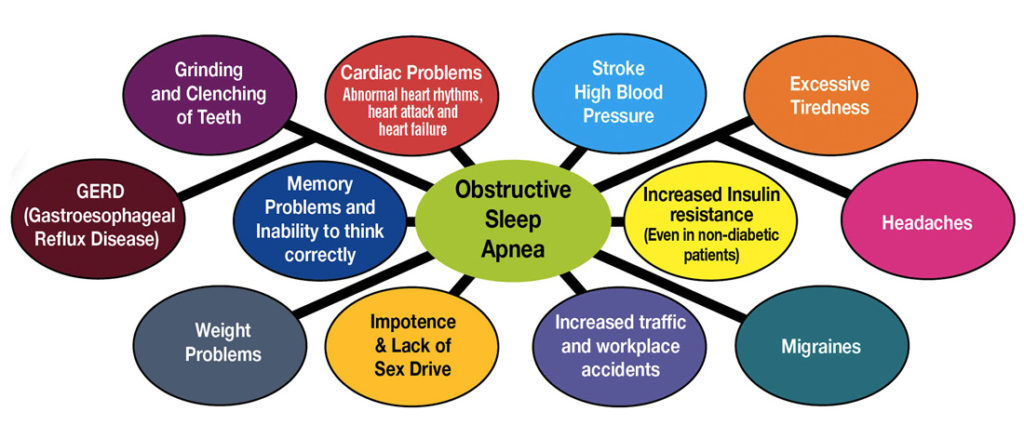Living With Sleep Apnea: What You Can Expect

Sleep apnea is a condition that interrupts your breathing while you sleep, causing you to wake up constantly throughout the night. Without treatment, it can lead to a wide range of consequences for your overall health.
If you want to ensure you stay ahead of this condition, explore our guide to learn about the causes and symptoms of sleep apnea.
Risk Factors for Sleep Apnea
There are several factors that can increase your risk of sleep apnea. Men are more likely to suffer from the condition than women, and everyone’s risk increases as they get older, regardless of gender.
Additional risk factors for sleep apnea include:
- Excess weight
- Large neck circumference
- Smoking
- Drinking alcohol
- Nasal congestion
- Family history of sleep apnea
Symptoms of Sleep Apnea
Sleep apnea presents a range of debilitating symptoms, some of which include:
- Loud, frequent snoring
- Gasping or choking sounds overnight
- Lack of motivation
- Daytime fatigue
- Short-term memory problems
- Sudden mood shifts
- Waking up with a headache and/or dry mouth
- Diminished libido
Consequences of Untreated Sleep Apnea
Without treatment, sleep apnea can lead to further health complications, some of which may threaten your life. Among the most common are heart disease, strokes, diabetes, and liver problems.
Due to lack of sleep, patients with sleep apnea are also likely to develop complications for their mental health. Feeling tired and unmotivated every day can take its toll and influence nearly every aspect of your life. As a result, sleep apnea can lead to depression.
Visit Dr. McCoy for Sleep Apnea Treatment
If you’ve been diagnosed with sleep apnea, Dr. McCoy can provide the relief that you’re looking for. As an alternative to CPAP machines, which most patients find too loud and uncomfortable to sleep with, we feature comfortable oral appliances that help you sleep soundly through the night.
As a Diplomate of the American Board of Dental Sleep Medicine, Dr. McCoy will ensure that your appliance fits comfortably and delivers effective results. Call our practice at (610) 358-5690 to schedule your consultation today.
Frequently Asked Questions
Does sleep apnea cause headaches?
People with sleep apnea often wake up with a headache in the morning. This headache is similar to a migraine. These headaches occur due to oxygen deprivation while you’re asleep.
Sleep apnea headaches are often felt on the sides of your head occur when you first wake up in the morning.
Oral appliance therapy can help your headaches to go away by treating the cause. You’ll be able to breathe at night and wake up feeling refreshed.
Are sleep apnea and snoring the same thing?
No, snoring doesn’t mean you have sleep apnea. Snoring is a common and noticeable symptom of sleep apnea, but it can also be a benign condition. If you snore loudly and/or frequently, we recommend undergoing a sleep study to determine if you have sleep apnea.
Even if your snoring isn’t related to sleep apnea, it can still have detrimental effects on your life. If you share a bed with a partner, you might be keeping them awake every night. This can put a strain on your relationship and turn you against each other.
Oral appliances can be used to reduce or eliminate snoring so you and your partner can sleep peacefully together. Vivos treatment also has the potential to make a permanent change to your mouth and throat structure so you won’t snore anymore.
When is sleep apnea dangerous?
Sleep apnea has the potential to be life-threatening if you leave it untreated. Untreated sleep apnea can lead to heart disease, heart attacks, strokes, and high blood pressure. Additionally, many people with sleep apnea are affected by anxiety and depression.
With treatment, sleep apnea is a manageable condition that hardly interferes with your life. While you’ll need an oral appliance, these are comfortable and portable devices that only need to be worn when you sleep.
Lifestyle changes, such as diet, exercise, and positional sleep therapy, can further improve your symptoms and decrease your risk for serious health conditions.
"*" indicates required fields
